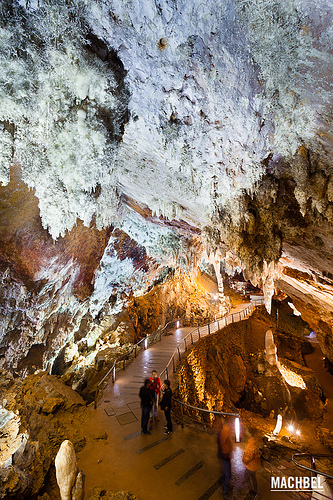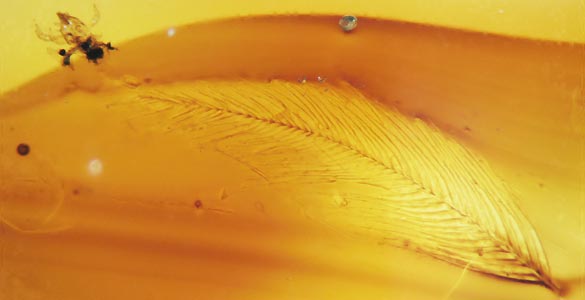The properties of glasses, at low temperatures, persist for millions of years, according to research by the Higher Council for Scientific Research (CSIC) and the Autonomous University of Madrid, which have analyzed the amber over 110 million years, in the cave of El soplao, in Cantabria.

Sala principal de la cueva El Soplao, Cantabria, North of Spain, by Victor Gomez, at flickr.com
Thus, the study, published in Physical Review Letters, explains that while the glass is known for years, its nature is one of the most controversial issues of physics. In the investigation have been studied amber samples from this cave, of which formation dates back to the Cretaceous and which have undergone a process of aging and thermodynamic stabilization.
Specifically, at the Institute of Materials Science, CSIC, in Madrid, has been made analyzing speed of sound through Brillouin spectroscopy, a method that allows to obtain information through the interaction among light and matter. With this technique, scientists have come to know the evolution of the studied specimens with temperature.
Meanwhile, in the low temperature laboratory at the Autonomous University have been characterized the thermodynamic properties. The experiments, according to the CSIC, have enabled experts to prove that the two most important and pervasive characteristics of solid glassy at low temperatures (the presence of systems of tunneling of two levels and the so-called 'boson peak') remain unchanged essential for these highly stabilized, in contrast to what was generally believed, during the last 40 years.
"While glass is known for thousands of years, from the point of view of physics, its nature is one of the most controversial issues for decades", says Rafael J. Jimenez Riobóo, from the Institute of Materials Science, which stressed that amber can be "a key" to shed light on this controversy, because its thermal history can be manipulated, and you can get an amber "rejuvenated" and take it again its glassy state.
Amber is a fossilized tree resin, produced from exudates of coniferous or angiosperms. Over time this resin undergoes maturation during which a progressive polymerization occurs, among other processes, and after long periods of time, which in some cases may exceed one hundred million years, it is fossilized.
This transformation in amber glasses is which was produced, at the site of the Soplao. Amber is a very important material for a Paleontology, since it is a unique preservation of very old bio-plant and animal inclusions, trapped in the viscous resin and then were fossilized, millions of years ago.
So, other amber deposits worldwide and with different chemical compositions or amber have proved invaluable, for the reconstruction of ecosystems and prehistoric life.

A feather preserved in amber
According to the researchers, this material could also become a useful model to elucidate many other puzzles, that continue to drive research the physics of glassy state, much unknown and discussed than relating to the crystalline state.
Finally, they say that for physics and chemistry, amber is a unique example of a glass that has aged, for a long time, below its glass transition temperature, reaching a state that is not accessible under normal experimental conditions.
Well, I think this is a very interesting project. I hope that you have liked too.
Till nex time, kind regards,
Luis.
Sponsored by Costaluz Lawyers.
Please click here below:
